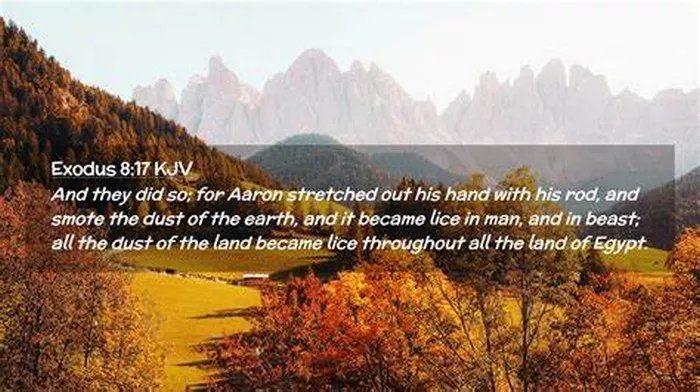Read the Daily Bible Verse – Exodus 8:17 To Strengthen Your Spiritual Journey.
The Bible is a rich tapestry of stories, teachings, and divine revelations that have guided believers for centuries. One such powerful narrative is found in Exodus 8:17, a verse that recounts a miraculous plague brought upon Egypt during the Israelites’ struggle for freedom. This article delves into the context, meaning, and relevance of this verse, providing insights for modern-day application.
The Context of Exodus 8:17 KJV
Exodus 8:17 (KJV) reads:
“And they did so; for Aaron stretched out his hand with his rod, and smote the dust of the earth, and it became lice in man, and in beast; all the dust of the land became lice throughout all the land of Egypt.”
1. Historical Background
The book of Exodus records the Israelites’ enslavement in Egypt and God’s intervention through Moses to secure their liberation. The verse is situated within the plague narrative, a series of divine judgments on Egypt designed to compel Pharaoh to release the Israelites. This particular plague, where dust is transformed into lice (or gnats, depending on translation), is the third in the sequence and reflects God’s supremacy over nature and false gods.
2. Sequence of Events Leading to Exodus 8:17
Before this plague, Moses and Aaron had confronted Pharaoh multiple times, warning him of God’s power and demanding freedom for the Israelites. Pharaoh’s repeated refusal led to the first two plagues:
- Water turning to blood (Exodus 7:14–24)
- The plague of frogs (Exodus 8:1–15)
Each plague intensified, demonstrating God’s dominance over Egyptian deities and Pharaoh’s impotence.
The Meaning of Exodus 8:17
1. A Display of Divine Power
The transformation of dust into lice underscores God’s authority over creation. Dust, often considered insignificant, is used by God to humble Pharaoh and the Egyptians. The scale of the miracle—where “all the dust of the land” became lice—illustrates God’s omnipotence and ability to use even the smallest elements of nature for His purposes.
2. Judgment Against Egyptian Deities
This plague directly challenges Egypt’s gods, particularly Geb, the earth god. By turning dust into lice, God demonstrates that even the earth, which the Egyptians revered, is under His command.
3. A Test of Authority
Aaron, acting under Moses’ direction, uses the rod to initiate the plague, signifying obedience and divine partnership. This act also emphasizes God’s choice of Moses and Aaron as His instruments of deliverance.
Exodus 8:17 Application in Life
1. Trusting in God’s Sovereignty
The plague of lice teaches believers to trust in God’s control over every aspect of life, no matter how small or mundane. Just as He used dust to fulfill His purpose, God can use the ordinary in our lives for extraordinary outcomes.
2. A Call to Humility
The Egyptians, with their wealth and advanced civilization, were humbled by something as minuscule as lice. This serves as a reminder to remain humble before God, recognizing that all power and glory belong to Him.
3. Obedience to God’s Commands
Aaron’s role in stretching out his hand demonstrates the importance of obedience in fulfilling God’s will. Believers are called to act in faith, trusting that God will accomplish His purpose through their actions.
Comparison with Other Biblical Texts
1. Parallels with Genesis 3:19
In Genesis, God tells Adam, “for dust thou art, and unto dust shalt thou return.” This reference to dust highlights humanity’s frailty and dependence on God. In Exodus 8:17, the transformation of dust into lice serves as a stark reminder of God’s power over life and creation.
2. Connection to Psalm 104:30
“Thou sendest forth thy spirit, they are created: and thou renewest the face of the earth.” This verse emphasizes God’s creative power, resonating with His ability to turn dust into living creatures during the plague.
3. Contrast with the Miracles of Christ
While the plagues in Exodus often involved destruction and judgment, the miracles of Jesus frequently brought healing and restoration. This contrast underscores the breadth of God’s power—both to judge and to save.
Modern-Day Relevance
1. A Reminder of God’s Control
In a world often dominated by human achievement and technological advancements, the story of the plague reminds us that God remains sovereign. No human power can rival His authority.
2. Lessons in Humility for Leaders
Pharaoh’s refusal to acknowledge God’s authority led to the suffering of his people. Modern leaders can learn from his example, understanding the importance of humility and submission to divine principles.
3. Encouragement Amid Challenges
For believers facing challenges, this verse provides assurance that God can transform even the most difficult situations into opportunities for His glory.
Conclusion
Exodus 8:17 is a powerful verse that illustrates God’s sovereignty, creativity, and judgment. Set within the broader narrative of the plagues, it demonstrates His supremacy over nature, false gods, and human arrogance. For modern believers, this verse serves as a reminder to trust in God’s power, remain humble, and act in obedience to His will. By reflecting on its context and meaning, we can draw inspiration to navigate our spiritual journeys with faith and conviction.
Exodus 8:17 Commentary
Biblical scholars and theologians have long reflected on the significance of Exodus 8:17. Key points of commentary include:
The Nature of the Lice: Some translations render the word as “gnats” instead of lice, reflecting differences in interpreting the original Hebrew term. Regardless of the specific insect, the emphasis remains on the miraculous nature of the event.
Pharaoh’s Reaction: Unlike the previous plagues, Pharaoh’s magicians were unable to replicate this miracle, leading them to declare, “This is the finger of God” (Exodus 8:19). This acknowledgment marks a turning point in the narrative.
Symbolism of Dust: Dust often symbolizes mortality and insignificance in the Bible. Its transformation into a plague highlights God’s ability to use even the humblest materials to achieve His purpose.
You Might Be Interested In:

